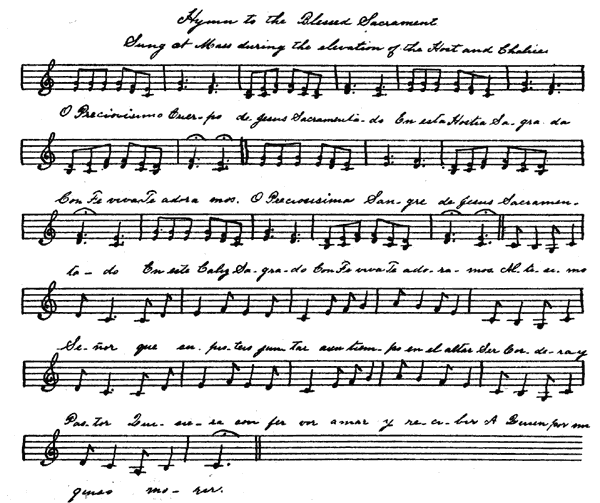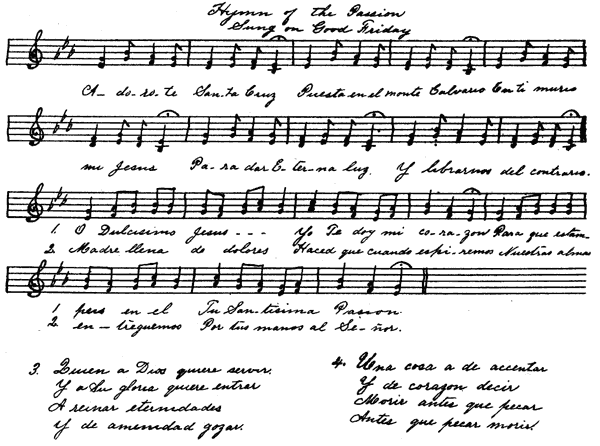| Home -> Philopolis Press -> Chimes of Mission Bells -> Chapter VII - Mission Anecdotes and Hymns | |||
|
Chapter VII
Mission Anecdotes and Hymns Told of Father Vicente Sarría Father Vicente Sarría, a venerable and saintly missionary in charge of Mission Nuestra Señora de la Soledad at the time the first two acts of Secularization were passed, was one of the keenest sufferers from the injustices of the times, undergoing untold labors and hardships, which in no small degree contributed to his death in 1833, which found him at his post of duty at the mission. Father Sarría's reputation for sanctity was well known throughout California, particularly in Monterey and Soledad, and after his death it was no strange thing to hear both from Caucasian and Indian such an ejaculation as "alma de nuestro Padre Sarría, ayudanos con tu intercesion" (soul of our Father Sarría help us by your intercession). Of course this pious demonstration was not public because for many wise reasons, the church forbids the public veneration or invocation of a saint until the required process of canonization has authorized it, however, the allowable private invocation was freely practiced as it has been done in the case of other saintly missionaries, namely, Junipero Serra, Magin Catalá and others. And the following sweet legend is told of Padre Sarría. As the Indian carriers lowered the humble redwood coffin which contained the Father's precious remains into the mission vaults, the edifice was filled with an exquisite fragrance as of roses, and this story told with all earnestness was given much credence about the mission towns. While not authenticated by infallible investigation, may not this incident be classed at least as a probability by the spiritual minded? For is it not in the power of the God of the beautiful in nature to proclaim thus His appreciation for the heroic charity of one of His servants, especially to strengthen the faith of the sorely tried convert Indians who clung so lovingly to the mission in the days of its trials? Father Junipero Serra's Promise One beautiful summer day while walking about the San Carlos Mission Garden, Junipero Serra pondered over the wonderful progress of California both in the spiritual and material order; filled with joy the good priest blessed the land, and made a solemn promise to celebrate one hundred masses for the future peace and prosperity of California, moreover he promised to begin the fulfillment of his promise on the following November, twenty-fourth, feast of Saint Charles, the patron saint of the mission. Soon after, the venerable Serra was overtaken by his last illness and went to his reward before November, the twenty-fourth. But every year on the eve of the feast of Saint Charles just before midnight a ghostly procession wended its way to San Carlos Mission, for all the missionaries, Spaniards, or their descendants who had ever lived in California would arise from their graves and with them all the Christian Indians of the mission towns joined the "ghostly throng" to San Carlos where Junipero Serra would arise from his tomb and celebrate mass while the spirits sang their ancient hymns, after which all the scene vanished like silver fumes of smoke, and this continued for one hundred years. This most unlikely legend has been told in beautiful Spanish and English poetry, and for all its unlikelihood has found its way with its weird charm into many homes. A True Story Somewhere in the eighteen fifties a non-catholic of very irreligious character, made targets of the eyes of a statue of Saint Benedict, belonging to San Carlos Mission, taking advantage of the neglected condition of the place at the time. A few days after this proceeding the man was struck blind. This incident is no legend, but within the remembrance of many old residents of Monterey. The unfortunate man later acknowledged that his calamity was a direct visitation of Almighty God for his gross and intentional irreverence to the image of a saint. The writer refrains from giving the name of this man who has long ere this passed to the "Great Beyond" but many Montereyans, who will read this sketch will know it. Countless stories and legends of mission times are told and written without the least foundation for veracity, for example the story of "The Lost Pearls of Loretto;" others are founded on facts but distorted beyond recognition. Still this is not startling in a land as full of sentiment and romance as California, where so many writers, (most of them "New-comers") have given vent to their poetical imaginations, and it is not hard to believe that the eventful history of the state contained many authentic stories, and legends with some ground of truth. |
|||
  |
|||
|
Hymn to the Immaculate Conception of the Blessed Virgin Mary[6].
"Para dar vida mortál A Un Dios Autor de la vida Sois Maria concebída Sin pecádo originál." "Para humillar la serpiénte Que con su mortál venéno Dejó todo el mundo lléno De su aliento pestilénte Que marcó à todo viviénte Con el sello mas fatál Sois Maria concebida Sin pecado originál." "Como Estér la mas amada Del mas generoso Asuéro Gracia recibes priméro Que estés del crimen manchada Pues para no ser contáda En la indignacion reál Sois Maria concebida Sin pecádo originál." "Ciudad fuérte y mas hermósa Que de Asírio acometida No logrará vérte herída Su saeta ponzoñosa Pues para ser victoriosa De su poder infernál Sois Maria concebida Sin pecado originál." "Luna lléna de esplandor Sin ser nunca eclipsáda Porque fuiste iluminada De un sol de poder, y amor Pues por no ver el horror De un eclipse criminál Sois Maria concebida Sin pecado originál." "Mujer heróica y valiente Que con divino valor Pisas gloriósa el furor De la engañósa serpiente Pues por no temer el diente De aqeste monstro infernál Sois Maria concebida Sin pecado originál." "Virgen que de nuestro suélo Subes vestida de estrellas Mas bela que las mas bellas A ser la gloria del ciélo Pues para tan alto vuélo Con un favor sin iguál Sois Maria concebida Sin pecado originál." "Patrona la mas amada De nuestro suélo Español Nuestro mas luciente sol En la noche desgraciada Pues para ser proclamada Con el voto mas cordiál Sois Maria concebida Sin pecado originál." "Concede en fin Madre amada A tus hijos este dia La mas cristiána alegria Y la muerte deseada Para que seas cantada En la patria celestial Sois Maria concebida Sin pecado originál." [6] This beautiful hymn is found in many ancient Spanish books of devotion. |
|||